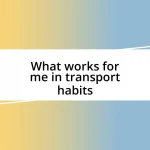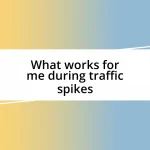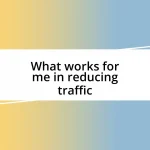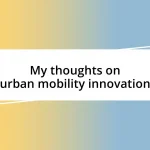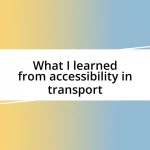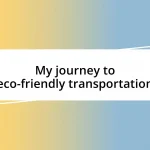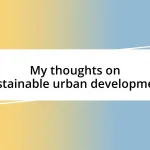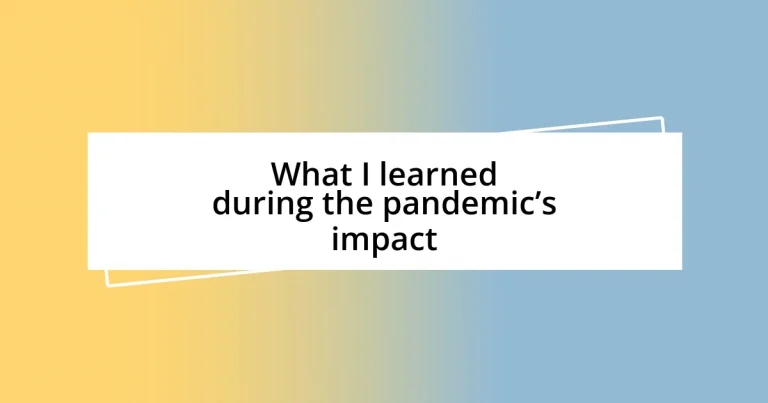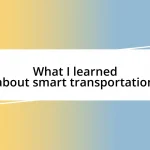Key takeaways:
- The pandemic highlighted the importance of community support and the positive impact of small acts of kindness.
- Mental health awareness grew significantly, emphasizing self-care and open conversations to foster connections.
- Adaptability in daily routines and remote work led to increased productivity and strengthened team communication.

Lessons from the pandemic experience
One of the most profound lessons I learned during the pandemic was the value of community. I remember feeling isolated and disconnected, yet there were moments when I received a simple text or a handwritten note from a friend. It was a reminder that even in solitude, we are never truly alone; support can often come from the most unexpected places.
Another insight that struck me was how adaptable we can be. I never imagined I would become proficient at virtual meetings or learn to cook an entire range of delicious meals from home. Have you ever found yourself surprised by your own resilience? These small victories added up, filling our days with purpose and creativity when the world felt stagnant.
Lastly, I realized the importance of mental health. I found myself scaling back on social media to protect my mental well-being; it became clear that not every opinion shared online was beneficial. Reflecting on this made me ask—what truly enriches my life? This newfound focus on mental health has prompted me to prioritize self-care and seek joy in daily rituals, reminding me that happiness often lies in the simplest of moments.

Changes in daily routines
The pandemic shifted the way I approached my day-to-day activities. For instance, I transformed my mornings, which were once filled with a rushed commute, into moments of mindfulness. I started practicing meditation while enjoying my first cup of coffee, a simple change that added clarity and ease to my day.
The evenings also underwent a significant makeover. Instead of heading out for social gatherings, I focused on creating meaningful connections at home. Virtual game nights with friends became a highlight. Who knew that a simple online trivia game could spark laughter and strengthen bonds just as much as a night out?
One of the most unexpected perks was embracing a flexible work routine. I found myself working in comfortable clothes rather than business attire. This change made me realize how much my environment affected my productivity. I felt more relaxed, and paradoxically, I became more focused! It taught me that sometimes, a change in scenery (or in this case, attire) can ignite creativity like nothing else.
| Before the Pandemic | During the Pandemic |
|---|---|
| Rushed mornings with a commute | Mindful mornings with meditation |
| Social gatherings at restaurants | Virtual game nights with friends |
| Traditional work attire | Comfortable work-from-home clothes |

Importance of mental health
Mental health truly emerged as a cornerstone during the pandemic. I vividly remember a period of feeling overwhelmed by uncertainty. As days merged into nights, I made a conscious effort to check in with my emotions regularly. I learned that acknowledging my feelings—that mix of anxiety and hope—was crucial. This practice revealed that mental health isn’t just about coping; it’s about thriving in the face of adversity.
- Mental health affects all aspects of our lives, from relationships to work performance.
- Daily self-care practices, such as journaling or taking a walk, became essential for maintaining balance.
- Having conversations about mental health became less stigmatized, allowing for open dialogue among friends and family.
- I discovered that sharing vulnerabilities actually strengthens connections with those around me.
These revelations underscored that prioritizing mental health is a proactive choice, not a reactive one. I found joy in simple daily rituals—like savoring my morning tea in silence—allowing me to cultivate a deeper sense of peace amidst the chaos.

Adapting to remote work
Working remotely during the pandemic was both a challenge and a revelation for me. Initially, I struggled with boundaries; the line between work and home blurred. I remember one particular day when I was still in my pajamas at 3 PM, furiously typing away. It hit me then—how could I expect to turn off my work brain if I didn’t create a dedicated workspace? I quickly transformed a corner of my living room into a cozy office. This small change made all the difference.
As I adapted, I realized the importance of clear communication with my team. Early on, I felt isolated, missing the spontaneous conversations that often sparked creativity. So, I initiated weekly check-ins—believe me, they turned into more than just work updates. These sessions fostered a sense of community where we could share not only project statuses, but also how we were feeling. Isn’t it funny how a simple video call can remind you that others are walking the same path?
Perhaps the most enlightening lesson was learning to embrace technology. Tools like Slack and Zoom became my lifelines. I confess, I wasn’t the most tech-savvy before the pandemic, but necessity breeds innovation. I started exploring features and shortcuts, discovering ways to streamline my tasks. It was exhilarating! Looking back, I realize this tech-savvy growth not only made me more efficient but also opened doors to new ideas and collaborations I hadn’t considered before. Isn’t it amazing how a little adaptability can lead to unexpected opportunities?

Strengthening community connections
The pandemic unfolded a tapestry of community connections I had never fully appreciated. I remember my neighborhood coming together in ways that felt profound. From virtual book clubs to socially-distanced gatherings in backyards, these moments reminded me how human connection can flourish, even when physical distance separates us. It was eye-opening to witness strangers becoming friends, united by a common goal: supporting one another through tough times.
I also discovered the power of local initiatives. During the initial lockdown, I volunteered to deliver groceries to those who couldn’t go out. There’s this incredible rush of warmth that comes from knowing you’ve made someone’s day a little easier. Each delivery came with stories—some heartwarming, others heartbreaking—showing me that everyone has their own battles. This experience opened my eyes to the importance of being present and actively engaging with my surroundings. Have you ever stopped to think about how small acts of kindness can ripple through a community?
Reflecting on this period, I realize that our collective experiences fostered a sense of belonging I hadn’t anticipated. It’s fascinating how adversity can inspire a renewed commitment to our communities. The pandemic encouraged me to support local businesses and artists, which not only helped them survive but also enriched my life with unique experiences. I often wonder—if we could harness this spirit of connection beyond the pandemic, what transformations could we achieve?

Building resilience for the future
Building resilience for the future requires a deep understanding of our capabilities and the lessons we’ve learned through adversity. For instance, during the pandemic, I realized the incredible strength that comes from adaptability. When I faced unexpected challenges, such as juggling work and home schooling, I became more resourceful. I began experimenting with flexible schedules, and it was a game changer. Have you ever noticed how adjusting your routine can uncover hidden strengths you didn’t even know you had?
In that difficult period, I embraced the importance of self-care. I remember one evening when I took a break from work to go for a long jog. The fresh air and movement cleared my mind, allowing me to process the day’s chaos. I learned that resilience isn’t just about toughening up; it’s also about nurturing oneself. How do you prioritize your well-being in the face of stress? For me, regular exercise and mindfulness practices have become invaluable tools in my resilience toolkit.
Lastly, forging a hopeful mindset emerged as a crucial lesson. As we navigated uncertain times, I found solace in setting small, achievable goals. Celebrating those mini-victories—whether completing a project or connecting with someone new—bolstered my optimism. I can’t help but wonder: what if we applied that approach in our everyday lives? By focusing on what we can control and recognizing our achievements, we not only build resilience but also cultivate a brighter future for ourselves and others.
